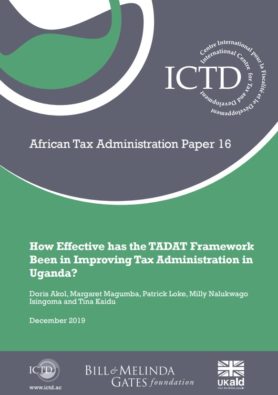African Tax Administration Paper 16
In 2013 the International Monetary Fund (IMF), in conjunction with other development partners, introduced the Tax Administration Diagnostic Assessment Tool (TADAT) to aid assessment of the performance of tax administrations around the world. The first TADAT assessment of Uganda’s tax administration was conducted in 2015, and the Uganda Revenue Authority (URA) resolved to adopt the TADAT framework in order to improve organisational performance. This study seeks to gauge the extent to which TADAT standards have been effective in improving the performance of tax administration in URA, taking both qualitative and quantitative approaches. An organisation-wide survey was conducted, making use of questionnaires, interviews and focus group discussions to collect data. Findings from the study indicate that 80 per cent of surveyed trained staff are aware of the benefits of implementing TADAT in URA, while 63 per cent of the untrained staff, who are the majority, are unaware of its benefits. Awareness about TADAT is relatively high among management staff, but low among staff at lower levels of the implementation chain. Several TADAT-fostered good practices have been implemented in URA, including separating the objections process from the audit process, introducing initiatives to improve client relations, improving the risk management function, and strengthening efforts towards having a clean taxpayer register. Among other benefits, the implementation of TADAT-fostered good practice has led to improved client relations, better delivery of service, and increased transparency and fairness to taxpayers. It has also helped to enhance the design of the Domestic Tax Department’s compliance improvement plan, resulting in improved compliance, reduced audit fatigue, and more efficiency in service delivery. This has led to increased revenue yield. This research highlights key factors for the successful assessment of performance of URA, and realisation of long-term benefits from the TADAT framework, spreading awareness to all levels of implementers, carrying out continuous organisational self-assessment against TADAT standards, and incorporating TADAT standards into organisational work plans.
